- Home
- Virginia Kantra
Home Before Midnight Page 2
Home Before Midnight Read online
Page 2
Or she could have gotten an assist into the water.
Steve nodded. “Okay. Who’s the R.P.?” Reporting party.
“The husband,” Lewis said. “Paul Ellis.”
“He find the body?”
“Negative. The deceased was discovered just after midnight by Bailey Wells, Mr. Ellis’s personal assistant. She lives with the family,” Lewis explained.
Steve followed the patrolman’s gaze across the room, where a skinny brunette knelt beside a handsome, haggard man in a leather armchair. Her dark hair hung in lank strands around her pale face. Her plain black blouse clung to her narrow rib cage, revealing the lines of her bra and the shape of her breasts. Steve felt an unwelcome twinge of compassion. There was something vulnerable and appealing about her, even though she wouldn’t win any wet T-shirt contests, for sure.
“Why is she wet?” he asked.
And why the hell hadn’t anybody thought to bring her a towel?
“She pulled Mrs. Ellis out of the pool,” one of the other cops volunteered.
Steve looked to Lewis for confirmation.
Lewis nodded. “Apparently she was trying to resuscitate her when Mr. Ellis called 911.”
Well, that was natural, Steve conceded. Competent. Even heroic. It was just too bad the brunette’s intervention had further fucked up an already compromised crime scene.
Despite her bedraggled appearance, she was talking soothingly to the man in the chair, patting his arm.
Steve narrowed his eyes. “Who’s the guy?”
“That’s Paul Ellis.” Lewis sounded surprised he hadn’t known. “The writer.”
Like he was supposed to recognize him from his book jacket or something.
“Get her away from him,” Steve ordered.
“She’s comforting him,” the second cop said. “The man just lost his wife.”
Steve should sympathize. He’d lost his own wife thirty-one months ago. But however much he had railed against Teresa’s cause of death, at least he’d known what killed her. He didn’t know what had killed Helen Ellis yet. And he didn’t like the fact that the two major witnesses at the scene had had ample opportunity to coordinate their stories.
He glanced again at the bereaved widower and the stringy-haired brunette, assessing their reactions. Ellis looked suitably distraught, like a man confounded by the accidental drowning death of his wife. Or like a man who had committed murder.
Beside Ellis’s red-eyed display of grief, his assistant, Wells, looked pale but composed. Maybe too composed?
Steve admired self-control. He had no use for hysterics. But Bailey Wells had known the dead woman. Lived in her house. Discovered her body. He expected her to demonstrate some emotion at her death.
He studied Wells’s white face, her dilated pupils. The result of shock, maybe. It definitely wasn’t grief.
“She lives here, you said?” he asked Lewis.
“Yes, sir.”
He watched Wells lean forward to murmur to Ellis and wondered. Just how personal an assistant was she?
“Have you notified the medical examiner yet?”
“No, I . . . the paramedics responded first and I—”
“Do it now,” Steve ordered. He was too late to preserve the scene, but at least the ME could view the body. “I’m going to get consent from Ellis before I do a walk-through. Lewis, I want you to take pictures. We need to record the scene before the body’s moved. In the meantime, separate those two until I can take their statements. And somebody bring that woman a towel.”
BAILEY was barely holding it together. She huddled on a kitchen chair, listening to the low voices and slow footsteps outside, feeling as if her head had disconnected from her neck and was floating somewhere above her body.
Her body. Floating.
Bailey shuddered.
“You want another towel?” asked the female officer who had been banished with her to the kitchen. Like Bailey needed a baby-sitter.
Or a guard.
She shuddered again. She couldn’t seem to stop shaking, bone-deep tremors neither the warm night or her now-damp towel were doing a damn thing to dispel.
“No, thank you,” she said politely, because her mama had raised her children to be respectful to the law. Anyway, it wasn’t the officer’s fault Bailey was stuck in here while poor Paul wrestled his grief and guilt alone.
She’d felt better when she could comfort him. She’d felt useful. Valued. Glad.
And then she had despised herself because it was wrong to rejoice in being needed when he was hurting so and Helen was . . .
God, she couldn’t believe it. Helen was dead.
Bailey hugged the towel around her shoulders as if it could shield her from the memory of Helen’s flaccid face and vacant eyes. She had put her mouth on Helen’s cold, slack mouth. She had blown her breath into Helen’s unresponsive lungs. She’d done everything she knew how to do, over and over until she was dizzy, and it hadn’t been enough.
Now she couldn’t do anything. She couldn’t see anything. The police had closed the kitchen blinds, leaving her to worry. And to wait. She sat, stunned. Numb. Her hands twisted in the towel. Her mind tumbled and spun like a double-load dryer at the laundromat.
Maybe she should call her parents? Or a lawyer. But she felt too guilty to face her mother’s eyes, and she wasn’t guilty enough to need a lawyer.
There had to be something she could do.
Bailey stirred on the hard wooden chair. “Do you want some tea? Sweet tea?” she added, in case the cop thought in this house of death and Yankees she might not be served the proper syrupy beverage that lubricated the South.
The woman—OFFICER M. CONNER, read the nametag on her uniform—looked surprised, as if the chair had spoken.
Bailey saw the “no” forming in her eyes and offered, “Or I could make coffee.”
“I guess I could drink coffee,” the other woman conceded.
Relieved, Bailey stood, forcing her knees to support her, her hands to uncurl, her mind to focus on the mundane task of spooning grounds into a paper filter. She had just put the pot under the drip when the door slid open and the tall, plainclothes detective came in from the flood-lit patio.
Bailey remembered him because he stuck out—older than the officers who had first appeared on the scene, younger than Paul, and confident in a macho way that raised her hackles. Beneath his loose sport coat and heat-wilted shirt, his body was solid. Muscled. His eyes were black and bold, his features harsh and so aggressively masculine he was almost homely.
She thought at first, stupidly, he had been attracted by the smell of the brewing coffee.
He nodded once to Conner before his hard, cop’s eyes sought Bailey. “Miz Wells? I’m Lieutenant Burke.” His deep-timbred twang plucked her nerves. “I’d like to ask you a few questions.”
Bailey nodded, her teeth chattering. She couldn’t think. She needed time. She snagged a mug down from the cabinet, unable to control the trembling of her hand. “Coffee?”
“No, thank you, ma’am.” He didn’t smile.
Her head still felt light. Her heart was racing. “Do you mind if I get some for myself and Officer Conner?”
“You all go right ahead,” he said, just as polite, but with a rasp in his voice.
She poured two coffees, added milk to her own, and put the cream and sugar within easy reach of the female officer. The whole time, Lieutenant Burke watched her, a glint in the back of those eyes, like he wasn’t used to being put off.
Bailey sat back down, leaving her coffee untouched on the table. Burke had taken the chair opposite hers, his bulk cutting her off, hemming her in, creating an island of privacy in the brightly lit kitchen. His knees were large and square. And too close, she thought, but she didn’t know how to scoot back her chair without offending him.
She folded her hands to hide their shaking and waited.
“All comfortable now?” Burke asked.
Bailey flushed. “Yes, thank you.”
&
nbsp; He pulled a notebook from his breast pocket. She braced herself to relive the horrible moments with Helen in the pool. “Where are you from, Miz Wells?”
She gaped at him. Shouldn’t he be asking about Helen? About the accident? But she pulled herself together to answer. “I’ve spent the past four years in New York.”
Lieutenant Burke didn’t look impressed. She wasn’t trying to impress him, she reminded herself.
“And you moved here . . .”
“Over three weeks ago.” Her throat relaxed as she swallowed. Maybe his questions were intended to put her at ease.
“Why?”
Why did it matter? “Because Helen wanted to,” she answered evenly.
And Helen always got what she wanted. With her children grown and flown and her prize-winning husband receiving the lion’s share of attention in New York, Helen wanted to go home.
Burke made a sound, a masculine grunt that could have been challenge or acknowledgment. “Helen. That’s the deceased.”
A statement, not a question. Bailey nodded anyway.
“What was your relationship with her?”
Bailey tightened her hands in her lap. “I work for her husband.”
“And what is it you do, Bailey? May I call you Bailey?”
Despite the drawled intimacy, she didn’t think he liked her. Her sister would have known how to make him like her. Maybe they even knew each other. He looked about her sister’s age.
Bailey nodded again. She felt like one of those plastic dogs in the rear window of a car, her head bobbing with every bump in the road. She stiffened her neck. “I’m his research and editorial assistant.”
Burke didn’t look impressed by that, either. “For how long?”
“Two years.”
“So you’ve known Helen Ellis . . .”
“Two years,” Bailey repeated, bewildered. Uneasy.
Those hard, dark eyes met hers. Bailey felt the jolt in her stomach. “Did you like her?”
Bailey’s heart pounded. Nobody liked Helen, not even her children. She was like a wasp, shiny and dangerous, with an annoying buzz and a painful sting.
Bailey moistened her lips. “I’m sorry she’s dead.”
Burke was silent, his gaze still narrowed on her face. She stared back like a possum caught in the headlights of an oncoming car.
“All right.” He flipped a page in his notebook. “Tell me what happened here tonight.”
Relieved, she did her best to cooperate. Prompted by his questions, she told him about dinner—just the three of them, cold chicken and a salad she had picked up earlier in the day from the natural foods market—everything as usual, everything fine.
She wasn’t stupid. She knew he was trying to establish whether Helen’s death was an accident, just as she knew that over sixty percent of the time, female homicide victims were killed by a spouse. But even the indignation she felt on Paul’s behalf—poor Paul, what must he be feeling?—was muted and blurred, as if she were still struggling underwater. She clung to facts as if they were lifelines tossed to her by the grim-faced, deep-voiced detective.
After dinner, they had followed their regular routines. Paul had gone to his study to work. Helen had gone to bed.
“Did you see her go to her room?”
Bailey forced herself to remember. “No. I took a walk. I usually take a walk.”
“Anybody see you on your walk?”
Dazed, it took her a moment to realize he was asking if she had an alibi. “I don’t . . . No.”
“You don’t know?”
She was so tired. “I didn’t see anybody.”
“How about when you got back?” he asked. Casual. Relentless. “Did you see anybody then?”
“No.”
“Mrs. Ellis? Mr. Ellis?”
“No.”
“Wasn’t that unusual?”
“Not really,” she said, adding with weary humor. “It’s a big house.”
He didn’t smile.
She tried another answer to satisfy him. “I don’t like to intrude on the Ellises in the evening.”
“But they weren’t together, you said.”
“No.” She didn’t think so.
“Do you remember what time it was?”
“Late. After nine.”
Burke glanced at his notes. “And Mr. Ellis was still working?”
“Yes.” She was pretty sure.
“Why didn’t you go to his study? To see if he needed you?”
Her mouth went dry. She reached for her coffee, but it was cold. She took one sip and put it down. She never sought out Paul at night. It was one of her rules, painfully arrived at and scrupulously adhered to.
“You’re his assistant,” Burke said in that deceptively laid-back voice. “It would be only natural for you to check in with him.”
“I went to my room,” she said firmly. Too firmly. “To read.”
Burke sighed. “And where is your room?”
She told him. She was used to organizing facts. Good at remembering details. She told him the layout of the house and the view from her window and the exact time she had left her room to get ice cream.
“Butter pecan,” she said before he could ask. “It’s my favorite flavor.”
His mouth didn’t so much as twitch, but there was a gleam in those dark, dark eyes. Humor, maybe. Respect? Or suspicion. Bailey didn’t know him well enough to guess. She didn’t want to know him.
“Why two spoons?” he asked.
Bailey felt faint. Her pulse pounded in her head. “Excuse me?”
Burke’s face was like a rock. His voice grated. “We found two spoons by your broken bowl. Who was the second spoon for?”
TWO
THE brunette’s pale lips parted. Her deep brown eyes widened in distress.
Gotcha, sugar, Steve thought, but there was no satisfaction in it. Not much satisfaction in anything anymore.
He pushed the thought away. And waited.
She closed her mouth.
“The spoons?” he prompted.
“I thought . . . If anyone joined me . . .” She fell silent.
“Anyone?”
Her thin face flushed.
“Mrs. Ellis?” Steve asked, though he knew damn well her employer’s wife hadn’t brought that blush to her cheeks.
Bailey Wells shook her head, avoiding his eyes.
“Then . . . ?” He wanted her to say it. He wasn’t going to lead her.
Her flush deepened. “Sometimes, when he’s working late, sometimes Paul will take a break. I thought . . . It was so hot. . . . Not that I would interrupt him or anything,” she added hastily.
Sure you wouldn’t, Steve thought. It’s late at night, the wife’s out of the picture for the evening. . . . It was the perfect opportunity for a poolside rendezvous.
The perfect setup for murder.
“So the second spoon was for Mr. Ellis,” he said without expression.
“Not really. Maybe. I just wanted to be prepared.” Bailey Wells met his gaze with defiant humor. “Like the Boy Scouts.”
Something in her eyes, wry and honest, pricked Steve’s weary resignation. A little of his suspicion leaked away.
Possible. Not every conveniently dead spouse was dispatched by an unfaithful husband, a too-eager girlfriend.
He made a note. “So you got your ice cream. And then?”
“And then I saw her. Helen.” Bailey’s slim throat moved as she swallowed. “In the pool.”
Steve squelched his instinctive, protective response, the conditioned reflex of male hormones and Southern upbringing to a Woman in Distress. Teresa had known just how to play that big-eyes-and-trembling-lip routine to get him to do what she wanted. So did Gabrielle. But he was tougher on the job. He’d trained himself to be.
“Let’s go back a minute. You saw her from here? The kitchen?”
“No. I suppose I could have, but . . .” Bailey frowned with the effort of remembering. “No.”
“So you came out
side.”

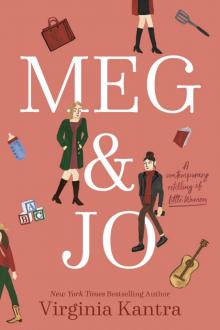 Meg and Jo
Meg and Jo All a Man Can Do
All a Man Can Do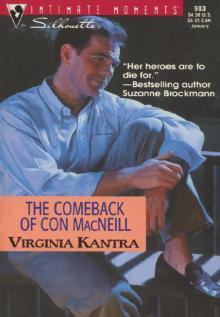 THE COMEBACK OF CON MACNEILL
THE COMEBACK OF CON MACNEILL All a Man Can Be
All a Man Can Be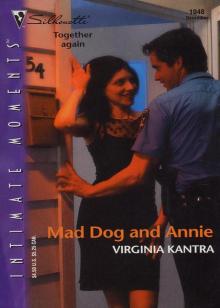 MAD DOG AND ANNIE
MAD DOG AND ANNIE![Dare Island [2] Carolina Girl Read online](http://i1.bookreadfree.com/i/03/26/dare_island_2_carolina_girl_preview.jpg) Dare Island [2] Carolina Girl
Dare Island [2] Carolina Girl Forgotten Sea
Forgotten Sea Sea Lord
Sea Lord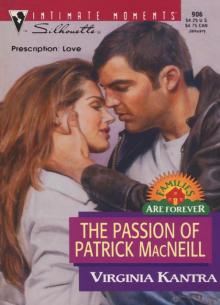 THE PASSION OF PARICK MACNEILL
THE PASSION OF PARICK MACNEILL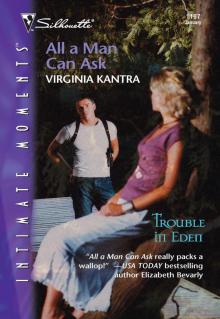 All a Man Can Ask
All a Man Can Ask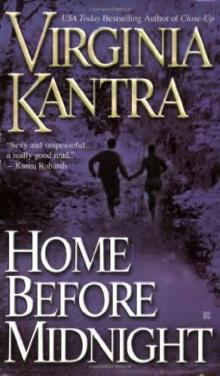 Home Before Midnight
Home Before Midnight Family Secrets: Books 5-8
Family Secrets: Books 5-8 Carolina Dreaming: A Dare Island Novel
Carolina Dreaming: A Dare Island Novel Carolina Home
Carolina Home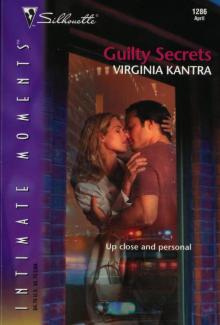 GUILTY SECRETS
GUILTY SECRETS Carolina Blues
Carolina Blues Carolina Man
Carolina Man Carolina Man (A Dare Island Novel)
Carolina Man (A Dare Island Novel) STOLEN MEMORY
STOLEN MEMORY Carolina Heart
Carolina Heart Immortal Sea
Immortal Sea THE TEMPTATION OF SEAN MCNEILL
THE TEMPTATION OF SEAN MCNEILL Sea Fever
Sea Fever